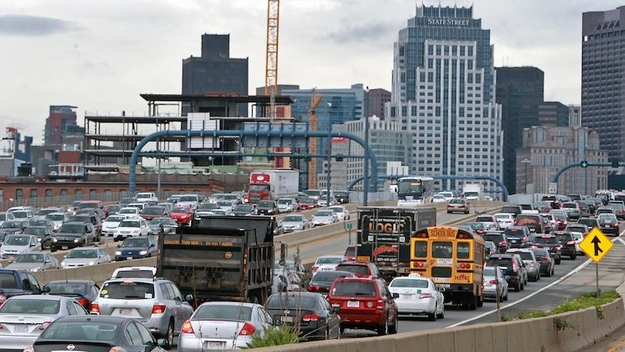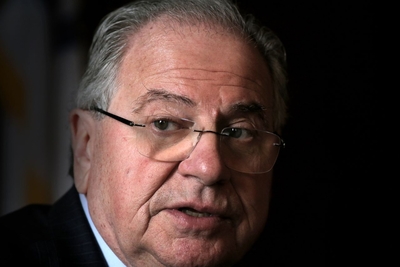 Studies of the nation's transportation networks have concluded for years that Massachusetts has some of the most cracked, crumbled, and corroded highways and bridges in the country. |
'WHEN IT COMES to our transportation system, revenue can't wait," declared Robert DeLeo, the Massachusetts House speaker, when he unveiled a bill last month to raise taxes by $600 million. "Revenue can't wait any longer."
Since the House, for all intents and purposes, is a one-party institution whose members vote as they're told, there wasn't any doubt that DeLeo's bill would be approved. What passes for deliberation on Beacon Hill began in the House on Wednesday afternoon and was over by Wednesday night. A number of amendments to soften the measure's tax bite were introduced, only to be withdrawn or handily defeated. After a legislative session "that featured little public debate and lengthy periods of public inactivity," as the State House News Service put it, the bill was overwhelmingly approved.
If the Senate concurs, DeLeo's legislation will raise the state tax on every gallon of gasoline to 29 cents and on diesel fuel to 33 cents, hikes of 20 percent and 38 percent respectively. It will raise the tax on Uber and Lyft rides by 500 percent, from 20 cents per ride to $1.20. It will also strip the sales tax exemption from rental car companies that purchase additional vehicles, and jack up the annual minimum corporate excise tax from $456 to as much as $150,000. The commonwealth, already inundated with tax receipts, will collect even more of the revenue that DeLeo claims "can't wait any longer."
But DeLeo is wrong.
The overlords of the Massachusetts transportation system aren't in dire straits for lack of revenue. Taxes have been gushing into the state's coffers at record-busting levels. In fiscal year 2019, Massachusetts collected nearly $2 billion more in taxes than it had the year before, a surplus much higher than officials had anticipated. And the flood of incoming dollars hasn't slowed: "Tax receipts over the first seven months of fiscal 2020 are up 4.9 percent," reports the State House News Service — a whopping "$794 million over the same period in fiscal 2019."
To be sure, Massachusetts roads need fixing. Anyone who drives the state's highways and byways knows what wretched condition many of them are in. Comparative studies of the nation's transportation networks have concluded for years that Massachusetts has some of the most cracked, crumbled, and corroded highways and bridges in the country. Last summer, USA Today published a state-by-state ranking of decrepit transportation infrastructure, based on data from the Federal Highway Administration. Massachusetts ranked sixth from the bottom. Yet when it came to state highway spending per driver, the same study found that the Bay State was smack in the middle, at No. 25. Many states with far better roads — Nevada, Utah, Arizona, and Georgia, for example — spend far less per driver.
The problem with Massachusetts highways isn't a shortage of funds. It's how those funds are spent. Or rather, squandered.
Each year the Reason Foundation, a market-oriented think tank with a longstanding focus on transportation, issues a detailed study of each state's highway system. The foundation ranks the states in multiple categories, including traffic fatalities, pavement condition, congestion, spending per mile, and so on. In one area, Massachusetts has an outstanding record: Its highway fatality rate is the lowest in America. But when it comes to cost-effectiveness — to the amount of money Massachusetts spends per mile, both on maintenance and administration — its record is atrocious.
In the most recent Reason report, Massachusetts ranked 48th out of 50 in total overall highway spending per mile, and 45th in capital and bridge spending per mile. (The lower the ranking, the higher the dollar amount). Whereas South Carolina spends just $13,255 on each mile of state roads, Massachusetts disbursements amount to $216,066 per mile. Granted, the cost of living in Massachusetts is higher than average. But it's also higher than average in Virginia, where highway spending is nevertheless just $37,875 per mile, and in Maine, which manages to hold per-mile outlays to $41,847. Both states far surpass Massachusetts in their highway performance rankings. According to Reason's analysis, Virginia has the nation's second-best highway system; Maine ranks fourth.
 Massachusetts House Speaker Robert DeLeo, speaking during a press briefing on Beacon Hill to announce plans for higher transportation taxes and even more spending. |
In every area, Massachusetts' spending is out of control. Take maintenance. North Dakota, one of the best-managed highway systems in the nation, spends $1,657 on maintenance disbursements per mile. Maine spends $12,109. Massachusetts? $25,033.
Equally disgraceful is the commonwealth's spending on administration. Four states — Kentucky, Nebraska, Arkansas, and Missouri — manage to hold their administrative costs to less than $1,000 per mile of state highway. Within New England, Maine, New Hampshire, and Vermont all keep their administrative costs below $10,000 per mile. But Massachusetts pours a mind-boggling $23,950 per mile into highway administration. And what does it achieve for all that spending? One of the worst-run highway systems in the nation.
Plainly, the cure for what ails Massachusetts transportation isn't more revenue. It has plenty of that. What it needs more of is competent management.
In an interview, Baruch Feigenbaum, the lead author of the Reason Foundation's annual report, suggests that at the root of Massachusetts' consistently poor showing is a "very politically oriented" decision-making process. Construction and maintenance projects are selected not on the basis of neutral cost-benefit data, but on the basis of political clout. "Members of the transportation and other relevant committees," he says, "seem to have quite a bit of say into which projects are actually selected." Compounding the problem, in Feigenbaum's judgment, is the "unusually large number of full-time staffers" on the payroll of the Massachusetts transportation bureaucracy. Neither of those will surprise anyone familiar with Massachusetts politics.
Another $600 million a year in tax revenue is the very last thing the Legislature should support. Alas, raising taxes is Beacon Hill's default remedy for every ill. If DeLeo's bill becomes law, two outcomes are certain: The people of Massachusetts will get to keep even less of their own money. And they will continue to drive on some of the most expensive, yet worst-maintained, roadways in America.
(Jeff Jacoby is a columnist for The Boston Globe).
-- ## --
Follow Jeff Jacoby on Twitter.
"Like" Jeff Jacoby's columns on Facebook.
Want to read more Jeff Jacoby? Sign up for "Arguable," his free weekly email newsletter.

